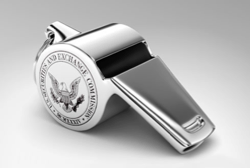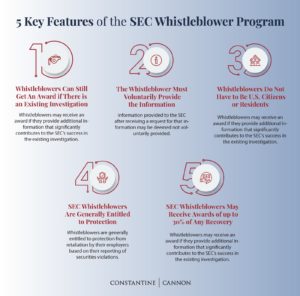SEC Whistleblower Program
What potential whistleblowers need to know about reporting fraud to the SEC
The SEC Whistleblower Program

The Whistleblower Program of the Securities and Exchange Commission encourages those with knowledge of violations of U.S. securities laws to share this information with the SEC.
Under the SEC Whistleblower Program, eligible whistleblowers are entitled to an award of between 10 percent and 30 percent of the monetary sanctions collected in actions brought by the government.
Topics Covered Here:
History of the SEC Whistleblower Program
In July 2010, in response to the 2008 financial crisis, Congress enacted the Dodd-Frank Wall Street Reform and Consumer Protection Act, known colloquially as “Dodd-Frank.” One of the most important components of this broad overhaul of the U.S. financial regulatory system was enactment of the SEC Whistleblower Program. Our SEC whistleblower lawyers will explain.
Elements of a Claim under the SEC Whistleblower Program
To protect investors, the SEC is charged with enforcing the U.S. federal securities laws.
It has broad investigative powers and can bring civil enforcement actions seeking monetary penalties and other civil remedies through actions in federal court or administrative proceedings.
A whistleblower may submit information about any possible violation of the federal securities laws that has occurred, is ongoing, or is about to occur.
Whistleblowers must provide the SEC with “original information,” meaning information that is not publicly available or information obtained as a result of the whistleblower’s independent analysis of public information. That independent analysis must reveal information not previously known to the SEC.
U.S. securities laws cover a wide range of actors and activities, and are not limited to publicly-traded U.S. companies.
Read examples of the types of fraudulent activity that can give rise to an SEC enforcement action on our SEC whistleblower law firm’s Financial & Investment Fraud page.
The SEC Whistleblower Program Process
Whistleblowers in the SEC program submit their information directly to the SEC using SEC “tip, complaint, or referral,” or “TCR” forms and procedures; they do not file a complaint in federal court.
Experienced SEC whistleblower lawyers can help whistleblowers submit stronger claims, connecting the whistleblower’s evidence with the applicable law to spell out the nature of the wrong in a compelling way to the SEC.
If a whistleblower is represented by counsel, the TCR form need not disclose the whistleblower’s identity. The whistleblower can proceed anonymously, to be contacted by the SEC through the whistleblower’s attorney. The SEC also subscribes to a policy of maintaining whistleblower confidentiality when announcing settlements and making awards.
Unlike the FCA, the whistleblower does not have any right to participate as a party in any enforcement action brought by the SEC against the defendant. If the SEC chooses not to pursue an enforcement action, the SEC Whistleblower Program does not provide a means for the whistleblower to independently pursue such an action.
If the information provided by the whistleblower leads to a successful SEC action with monetary sanctions exceeding $1 million, the whistleblower may then apply for a whistleblower reward.
To determine if you have a valid claim, contact a dedicated SEC whistleblower attorney from our law firm today.
The SEC Whistleblower Award
Whistleblowers may receive a reward of up to 30% of any government recovery. In determining the award percentage, the SEC considers factors such as the significance of the whistleblower’s information and the extent of the whistleblower’s assistance.
The SEC’s reward determination is not appealable, so long as the whistleblower is awarded between 10% and 30% of the monetary recovery. If the SEC denies the reward application, the whistleblower may file an appeal in a United States Court of Appeals.
Key Features of the SEC Whistleblower Program
- Whistleblowers may receive an SEC whistleblower award even if their information relates to an existing SEC investigation, if they provide additional information that significantly contributes to the SEC’s success in the existing investigation.
- The whistleblower must voluntarily provide the information about the securities law violation. Information provided to the SEC after receiving a request for that information from the SEC or other government agency may be deemed not voluntarily provided.
- Whistleblowers do not have to be “insiders.” They may receive SEC whistleblower rewards based on their independent knowledge or independent evaluation of publicly-available information.
- Whistleblowers are not required to be U.S. citizens or residents. Further, the illegal conduct doesn’t have to have taken place in the United States, as long as it affects the U.S. market.
- Employee-whistleblowers may generally proceed directly to the SEC Whistleblower Program, and do not need to first report their information through internal compliance procedures.
- Attorneys, corporate officers, auditors, and compliance personnel face additional hurdles as potential whistleblowers, and must carefully analyze how they came to learn the information they have to report and any obligations they may have to report that information through other processes.
- SEC whistleblowers are generally entitled to protection from retaliation by their employers based on their reporting of securities violations.
- There is no requirement that any government entity be financially harmed by the complained-of conduct.
Speak to a SEC Whistleblower Attorney About Your Case
This description of the elements and procedures of the SEC Whistleblower Program is general in nature. The SEC Whistleblower Program and the law surrounding it is complex. The lawyers at the SEC whistleblower law firm of Constantine Cannon understand the complicated, constantly changing landscape of state and federal whistleblower laws.
If you would like more information or would like to speak to a member of Constantine Cannon’s whistleblower attorney team, please Contact us for a Confidential Consultation. You may also reach us at (212) 350-2774.





